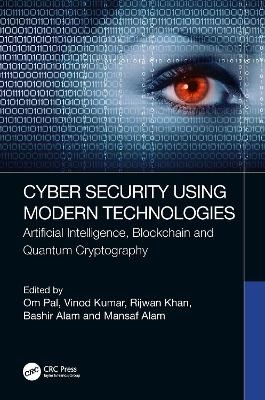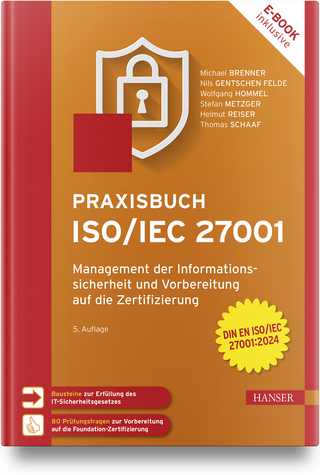
Cyber Security Using Modern Technologies
CRC Press (Verlag)
9781032213194 (ISBN)
The main objective of this book is to introduce cyber security using modern technologies such as Artificial Intelligence, Quantum Cryptography, and Blockchain. This book provides in-depth coverage of important concepts related to cyber security. Beginning with an introduction to Quantum Computing, Post-Quantum Digital Signatures, and Artificial Intelligence for cyber security of modern networks and covering various cyber-attacks and the defense measures, strategies, and techniques that need to be followed to combat them, this book goes on to explore several crucial topics, such as security of advanced metering infrastructure in smart grids, key management protocols, network forensics, intrusion detection using machine learning, cloud computing security risk assessment models and frameworks, cyber-physical energy systems security, a biometric random key generator using deep neural network and encrypted network traffic classification. In addition, this book provides new techniques to handle modern threats with more intelligence. It also includes some modern techniques for cyber security, such as blockchain for modern security, quantum cryptography, and forensic tools. Also, it provides a comprehensive survey of cutting-edge research on the cyber security of modern networks, giving the reader a general overview of the field. It also provides interdisciplinary solutions to protect modern networks from any type of attack or manipulation. The new protocols discussed in this book thoroughly examine the constraints of networks, including computation, communication, and storage cost constraints, and verifies the protocols both theoretically and experimentally. Written in a clear and comprehensive manner, this book would prove extremely helpful to readers. This unique and comprehensive solution for the cyber security of modern networks will greatly benefit researchers, graduate students, and engineers in the fields of cryptography and network security.
Dr. Om Pal received B.E. in Computer Science & Engineering from Dr. B. R. Ambedkar University, Agra, MBA in Operation Management from IGNOU, MS (Research) in field of Cryptography from IIT Bombay and Ph.D. in field of Cryptographic Key Management from Jamia Millia Islamia, New Delhi. He has more than 19 years of Academic & Research experience in various areas of Computer Science. He is currently a Scientist-D at Ministry of Electronics and Information Technology, Government of India. He has evolved and worked on many research projects of national interest. Previously he worked at Centre for Development of Advanced Computing (C-DAC) as a Sr. Technical Officer and as an IT Resource Person in National Thermal Power Corporation (NTPC). He has published many research articles in International Journals (Transaction/SCI/Scopus) and International Conferences of repute. He has been nominated in the board of reviewers of various peer-reviewed and refereed Journals. He has delivered many talks on cyber security, Quantum Security and Blockchain Technology. His research interest includes Cryptography, Quantum Cryptography, Cyber Security, Blockchain Technology, Theoretical Computer Science and Cyber Laws. Dr. Vinod Kumar is presently working as Assistant Professor with the department of Electronics and Communication (Computer Science and Engineering), University of Allahabad, Prayagraj, Uttar Pradesh, India. Before joining University of Allahabad, he worked as Assistant Professor in the Department of Computer Science and Engineering, Rajkiya Engineering College (REC) Kannauj, UP, India. Prior to this, he worked as Assistant Professor in the School of Information Technology, Centre for Development of Advanced Computing (C-DAC) Noida UP India. He has received MCA from Uttar Pradesh Technical University (UPTU) Lucknow UP, India in 2005, M.Tech in Computer Science and Engineering from Guru Gobind Singh Indraprastha University (GGSIPU) Delhi in 2011, and Ph.D. in field of Cryptographic from Jamia Millia Islamia (JMI), New Delhi. He has published various quality papers in the reputed International Journals like Elsevier, Springer, Wiley, etc. He has also presented various research papers in reputed International Conferences. He has written two books for undergraduate and postgraduate students of computer science and engineering. He has a rich academics & research experience in various areas of computer science. His research interest includes cryptographic protocols, Key management in multicasting/secure group communications, and authentication protocol and security in WSNs. Dr. Rijwan Khan received his B.Tech Degree in Computer Science & Engineering from BIT, M.Tech in Computer Science & Engineering from IETE, and Ph.D.in Computer Engineering from Jamia Millia Islamia, New Delhi. He has 16 years of Academic & Research Experience in various areas of Computer Science. He is currently working as Professor and Head of Department Computer Science and Engineering at ABES Institute of Technology, Ghaziabad U.P. He is author of three subject books. He published more than 50 research papers in different journals and conferences. He has been nominated in the board of reviewers of various peer-reviewed and refereed Journals. He is the editor of three research books. He chaired three international conferences and was a keynote speaker in some national and international conferences. Prof. Bashir Alam received his B.Tech.(Computer Engineering) from Aligarh Muslim University (A Central University of Government of India), Aligarh, Uttar Pradesh, India, M.Tech.(IT) from Guru Gobind Singh Indraprastha University, Delhi, India and Ph.D., from Jamia Millia Islamia (A Central University of Government of India), New Delhi, India. Currently he is a Professor & Head of the Department, Department of Computer Engineering, Faculty of Engineering and Technology, Jamia Millia Islamia, New Delhi. He has published several research articles/ papers in various reputed International Journals and Conference Proceedings published by reputed publishers like Elsevier, Springer, IEEE etc. He has filed patents on Conditional Access System, Cryptographic systems. His research interests include Block chain Technology, Network Security, GPU Computing, Big Data, Parallel Computing, Soft Computing, Computer Network, Operating System, Distributed and Cloud Computing, Advanced Computer Architecture and Intellectual Property Rights. He is also reviewer for several reputed international journals and Conferences. He is a Life Time Member of ISTE (Indian Society for Technical Education) and other technical societies. Prof. Mansaf Alam has been working as a Professor in the Department of Computer Science, Faculty of Natural Sciences, Jamia Millia Islamia, New Delhi-110025, Young Faculty Research Fellow, DeitY, Govt. of India & Editor-in-Chief, Journal of Applied Information Science. He has published several research articles in reputed International Journals and Proceedings at reputed International conferences published by IEEE, Springer, Elsevier Science, and ACM. His area of research includes Artificial Intelligence, Big Data Analytics, Machine Learning & Deep Learning, Cloud Computing, and Data Mining. He is a reviewer of various journals of International repute, like Information Science, published by Elsevier Science. He is also a member of the program committee of various reputed International conferences. He is on the Editorial Board of some reputed Intentional Journals in Computer Sciences. He has published three books: Digital Logic Design by PHI, Concepts of Multimedia by Arihant, and Internet of Things: Concepts and Applications by Springer, Big Data Analytics: Applications in Business and Marketing, Big Data Analytics: Digital Marketing and Decision Making by Taylor and Francis. He recently got International Patent (Australian) on An Artificial Intelligence Based Smart Dustbin.
Preface. Acknowledgments. Editors. List of Contributors. Chapter 1 Quantum Computing: A Global Scenario. Chapter 2 Post-Quantum Digital Signatures. Chapter 3 Analysis of Quantum Computing with Food Processing Use Case. Chapter 4 Security of Modern Networks and Its Challenges. Chapter 5 Security and Performance Analysis of Advanced Metering Infrastructure in Smart Grid and Use of Blockchain in Security Perspective. Chapter 6 Computation and Storage Efficient Key Distribution Protocol for Secure Multicast Communication in Centralized Environments. Chapter 7 Effective Key Agreement Protocol for Large and Dynamic Groups Using Elliptic Curve Cryptography. Chapter 8 Cyber Security Using Artificial Intelligence. Chapter 9 Cloud Computing: An Overview of Security Risk Assessment Models and Frameworks. Chapter 10 Generating Cyber Threat Intelligence to Discover Potential Security Threats Using Classification and Topic Modeling. Chapter 11 Cyber-Physical Energy Systems Security: Attacks, Vulnerabilities and Risk Management. Chapter 12 Intrusion Detection Using Machine Learning. Chapter 13 Network Forensics. Chapter 14 A Deep Neural Network-Based Biometric Random Key Generator for Security Enhancement. Chapter 15 Quantum Computing and Its Real-World Applications. Chapter 16 Encrypted Network Traffic Classification and Application Identification Employing Deep Learning. Index.
| Erscheinungsdatum | 04.08.2023 |
|---|---|
| Zusatzinfo | 47 Tables, black and white; 86 Line drawings, black and white; 22 Halftones, black and white; 108 Illustrations, black and white |
| Verlagsort | London |
| Sprache | englisch |
| Maße | 178 x 254 mm |
| Gewicht | 720 g |
| Themenwelt | Informatik ► Netzwerke ► Sicherheit / Firewall |
| Recht / Steuern ► Privatrecht / Bürgerliches Recht ► IT-Recht | |
| Technik ► Elektrotechnik / Energietechnik | |
| Technik ► Umwelttechnik / Biotechnologie | |
| ISBN-13 | 9781032213194 / 9781032213194 |
| Zustand | Neuware |
| Informationen gemäß Produktsicherheitsverordnung (GPSR) | |
| Haben Sie eine Frage zum Produkt? |
aus dem Bereich


